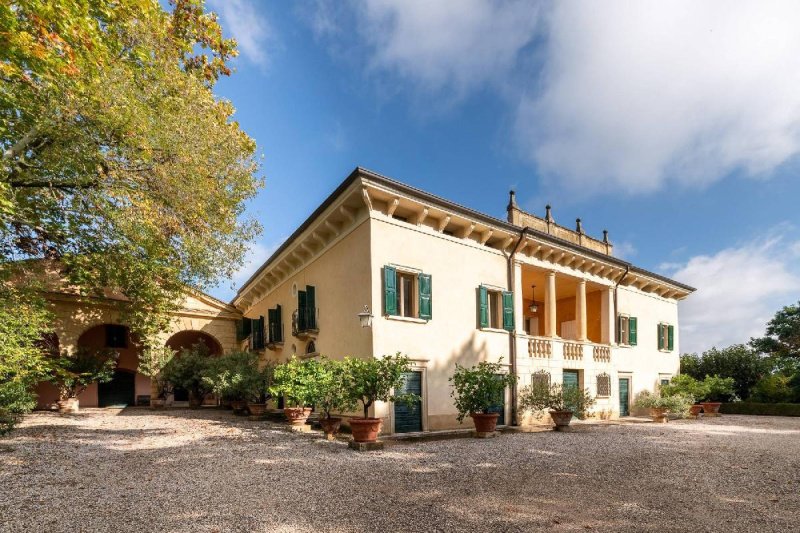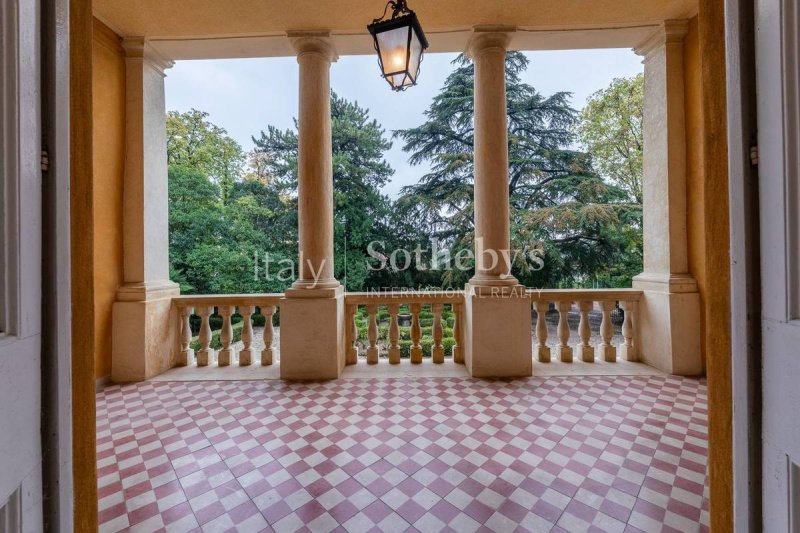Among the hills of Valpolicella, one can find this fascinating example of a Venetian villa in neoclassical style, built by the architect Luigi Trezza; the architect modernized the country residence of Giuseppe Salis, the last descendant of a famous family of Veronese apothecaries, giving the main facade of the complex a "Palladian" style structure with a loggia in the center with Doric columns that characterize the main Villa.
Due to its size and location, this property is suitable for both residential use and as a place of entertainment, suitable for hosting various types of events.
On the ground floor we find a small living room, a large kitchen with an imposing marble fireplace, which allows you to immerse yourself in an atmosphere of times gone by, where you can feel the charm of history; on the first floor we find a large living room, with double exposure and splendid views of the hills, the vineyard and the park; this room divides the two wings of the villa where the six bedrooms are located. Inside the property there are also some generously sized cellars. The property is completed by another L-shaped building intended for the garage, stables and greenhouse; edged with Guelph battlements of neo-medieval style, this building has on the west side, the "barcaccia" composed of a portico of three arches, surmounted by a large tympanum and is characterized by the presence of two imposing, well-preserved statues. To embellish this splendid property there is the presence of finds from the Roman era, such as for example in the entrance area of the villa where you can observe a counterweight of a large Roman press used until the last century.
The external space of the Villa is enriched by well-kept flowerbeds and a park with fruit trees, olive trees and a vineyard of approximately one hectare.
自动翻译所用的语言
Tra le colline della Valpolicella, troviamo questo affascinante esempio di Villa veneta in stile neoclassico, realizzata dall'architetto Luigi Trezza: l'architetto ha ammodernato la dimora di campagna di Giuseppe Salis, ultimo discendente di una famosa famiglia di speziali veronesi, dando alla facciata principale del complesso una struttura in stile "palladiano" con al centro una loggia con colonne doriche che caratterizzano la Villa principale.
Per dimensioni e posizione questa proprietà si presta sia per un uso residenziale che come luogo di rappresentanza, adatta ad ospitare eventi di vario genere.
Al piano terra troviamo un salottino, un'ampia cucina con un imponente camino in marmo, che permette di immergersi in un'atmosfera d'altri tempi, dove si percepisce il fascino della storia; al primo piano troviamo un ampio salone, con doppia esposizione e splendida vista sulle colline, sul vigneto e sul parco; questo ambiente divide le due ali della villa dove sono si trovano le sei camere da letto. All'interno dell'immobile ci sono anche alcune cantine di dimensioni generose. La proprietà è completata da un altro immobile ad "L" destinato alla rimessa, alla scuderia, e alla serra); orlato di merli guelfi di gusto neo-medievale, questo edificio ha sul lato ovest, la "barchessa architettonica" composta da un portico di tre arcate, sormontato da un grande timpano e si caratterizza per la presenza di due imponenti statue ben conservate. Ad impreziosire questa splendida proprietà vi è la presenza di reperti di epoca romana, come per esempio nella piazzola d'ingresso alla villa ove si può osservare un contrappeso di un grande torchio di epoca romana utilizzato fino al secolo scorso.
Lo spazio esterno della Villa è arricchito da aiuole ben curate e da un parco con alberi da frutta, ulivi ed un vigneto di circa un ettaro.
Zwischen den Hügeln von Valpolicella finden wir dieses faszinierende Beispiel einer venezianischen Villa im neoklassizistischen Stil, entworfen vom Architekten Luigi Trezza. Der Architekt hat die Landresidenz von Giuseppe Salis, dem letzten Nachkommen einer berühmten Familie von Veroneser Apothekern, modernisiert und der Hauptfassade des Komplexes eine "palladianische" Struktur mit einer Loggia mit dorischen Säulen in der Mitte verliehen, die die Hauptvilla charakterisiert.
Aufgrund seiner Größe und Lage eignet sich dieses Anwesen sowohl für Wohnzwecke als auch als repräsentativer Ort, der für verschiedene Veranstaltungen geeignet ist.
Im Erdgeschoss befinden sich ein Wohnzimmer und eine große Küche mit einem imposanten Marmorkamin, der es ermöglicht, in eine zeitlose Atmosphäre einzutauchen, in der der Charme der Geschichte spürbar ist. Im ersten Stock befindet sich ein großes Wohnzimmer mit doppelter Ausrichtung und herrlichem Blick auf die Hügel, den Weinberg und den Park. Dieser Raum teilt die beiden Flügel der Villa, in denen sich die sechs Schlafzimmer befinden. Innerhalb des Anwesens gibt es auch einige großzügige Keller. Das Anwesen wird durch ein weiteres "L"-förmiges Gebäude abgeschlossen, das als Stall, Pferdestall und Gewächshaus dient. Es ist mit Ghibellinen-Zinnen im neomittelalterlichen Stil verziert und auf der Westseite befindet sich die "architektonische Scheune" mit einem Portikus mit drei Bögen, gekrönt von einem großen Tympanon und gekennzeichnet durch die Präsenz von zwei gut erhaltenen imposanten Statuen. Diese herrliche Villa wird durch die Anwesenheit von Relikten aus der römischen Zeit verfeinert, wie zum Beispiel auf dem Eingangsplatz der Villa, wo man ein Gegengewicht einer großen antiken Weinpresse beobachten kann, die bis zum letzten Jahrhundert verwendet wurde.
Der Außenbereich der Villa ist mit gepflegten Blumenbeeten und einem Park mit Obstbäumen, Olivenbäumen und einem etwa ein Hektar großen Weinberg bereichert.
Parmi les collines de la Valpolicella, nous trouvons cet exemple fascinant de villa vénitienne de style néoclassique, construite par l'architecte Luigi Trezza ; l'architecte a modernisé la résidence de campagne de Giuseppe Salis, le dernier descendant d'une célèbre famille d'apothicaires véronais, en donnant à la façade principale du complexe une structure de style "palladien" avec une loggia au centre avec des colonnes doriques qui caractérisent la Villa principale.
En raison de sa taille et de son emplacement, cette propriété est adaptée à la fois à un usage résidentiel et à un lieu de divertissement, adapté à l'accueil de divers types d'événements.
Au rez-de-chaussée nous trouvons un petit salon, une grande cuisine avec une imposante cheminée en marbre, qui permet de se plonger dans une atmosphère d'autrefois, où l'on ressent le charme de l'histoire ; au premier étage nous trouvons un grand séjour, avec double exposition et vue splendide sur les collines, le vignoble et le parc ; cette pièce divise les deux ailes de la villa où se trouvent les six chambres. A l'intérieur de la propriété se trouvent également des caves aux dimensions généreuses. La propriété est complétée par un autre bâtiment en forme de L destiné au garage, aux écuries et à la serre ; bordé de créneaux guelfes de style néo-médiéval, cet édifice présente du côté ouest, la « barcaccia » composée d'un portique de trois arches, surmonté d'un grand tympan et se caractérise par la présence de deux statues imposantes et bien conservées. . Pour embellir cette splendide propriété, il y a la présence de trouvailles de l'époque romaine, comme par exemple dans la zone d'entrée de la villa où l'on peut observer un contrepoids d'un grand pressoir romain utilisé jusqu'au siècle dernier.
L'espace extérieur de la Villa est enrichi de parterres de fleurs bien entretenus et d'un parc avec des arbres fruitiers, des oliviers et un vignoble d'environ un hectare.


